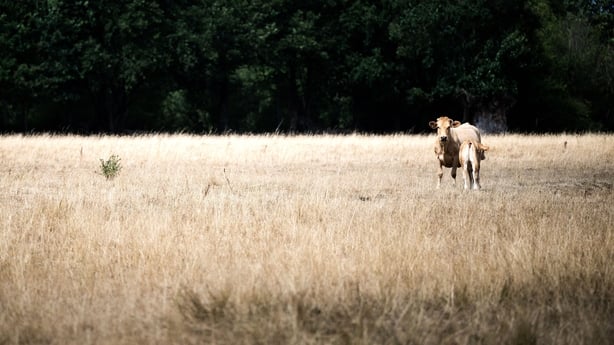France is on track to experience its driest July on record, its national weather service has said, with drought-like conditions leading to increasingly severe water restrictions around the country.
"The month of July will very likely be the driest July ever recorded since 1959," spokesman Christian Veil from Meteo-France said.
On average, just eight mm (0.3 inches) of rain fell across the country from 1-25 July, less than the previous low of 16 mm which was clocked in 2020, he said.
"We're in a very difficult situation even though we're only at the end of July," he said, saying soil humidity was at record lows and many trees were losing their leaves prematurely.
Farmers across the country are reporting difficulties in feeding livestock because of parched grasslands, while irrigation has been banned in large areas of northwest and southeast France due to water shortages.

as continuous dry weather affects many parts of the country
The flow of the river Loire for example, which empties into the Atlantic in northwest France, has fallen by a quarter since the start of July.
On the eastern river Rhine, which forms the France-Germany border, commercial boats are having to run at a third of their carrying capacity in order to avoid hitting the bottom because the water level is so low.
A total of 90 out of 96 administrative regions in mainland France have water restrictions of some sort, a record number, according to the environment ministry.
Like much of western Europe, the country is going through a punishing hot season of record temperatures and forest fires that have led to renewed focus on climate change.
After the third-driest spring on record and drought-like conditions since, rivers and reservoirs are running low nationwide, leading to increasingly severe water restrictions.
Since the start of the year, 151 days out of 204 have had an average temperature above the long-term average, a record since 1947, according to the national weather service Meteo France.
Consequences
From the normally verdant Alps to the most famous wine-growing areas in Bourgogne and Bordeaux, the consequences of months of almost rain-free weather are being felt.
In the Franche-Comte area in eastern France, water shortages have become so severe that several villages in the Doubs area are now dependent on water trucks delivering supplies.
The problem is felt acutely by the local dairy farmers whose cows need more than 100 litres of water a day.
"The price of water has double or even tripled compared to a few years ago," local farmer Aurelie Binet told France 3 television. "As farmers, whatever happens, we use large amounts of water."
Forest fires
France has endured two severe heatwaves in May and latterly in July - when temperatures soared above 40C.
Two huge blazes near Bordeaux in southwest France over the last fortnight have destroyed more than 20,000 hectares (49,000 acres) of tinder-dry forest and required around 2,000 firefighters to bring them under control.
Local authorities are restricting access to many wooded areas as a precaution, including the Calanques National Park along the Mediterranean coast near Marseille which is popular with tourists.
Experts say more severe hot periods and water shortages will become more common as global warming linked to greenhouse gas emissions takes a toll on the planet.


